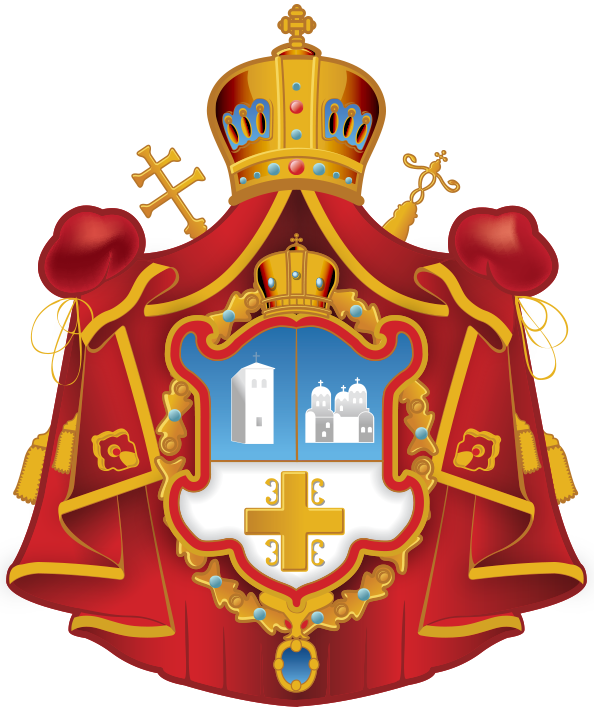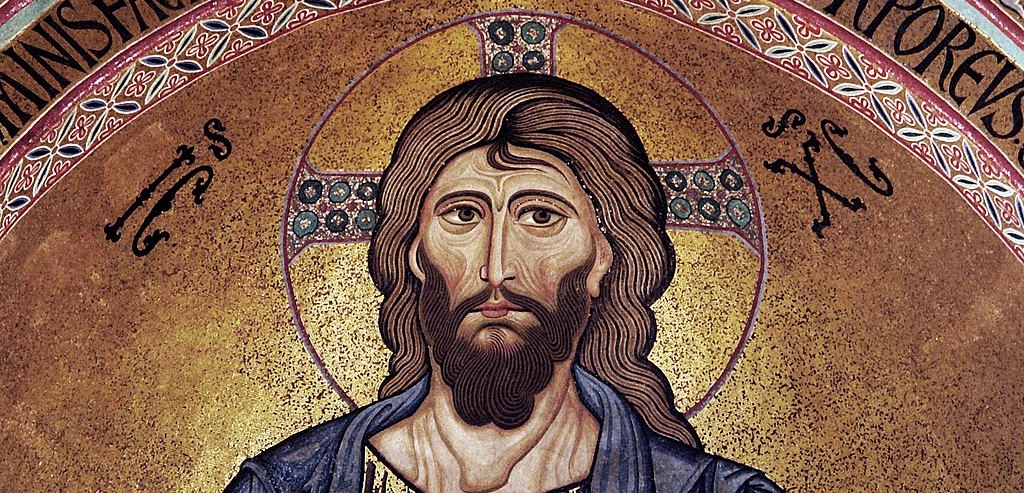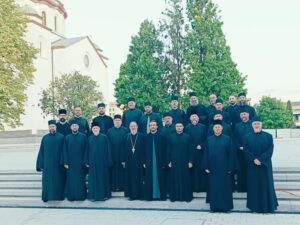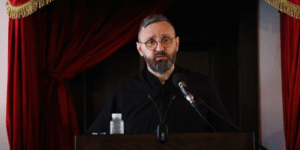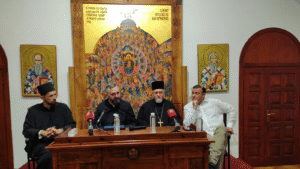We continue with the interpretation of verse 16:
Blessed Theophylact of Ohrid adds the following: “The great light is the Gospel. The (Old Testament) Law was also a light, but a lesser one. The shadow of death is sin, for sin is the image and likeness of death. Just as death overtakes the body, so sin overtakes the soul. The light has shone upon us, not because we sought it, but because it appeared to us on its own, as if it had been pursuing us.”
Saint Philaret of Moscow explains the phrase “shadow of death” as referring to sin, since sin deprives the soul of life—that is, of divine grace—though it does not destroy it, for the soul is immortal. According to him, the light that shines refers to Christ’s unexpected appearance before the Gentiles, who did not await Him as did the Jews. Saint Chromatius of Aquileia distinguishes between the words “darkness” and “shadow of death” in this verse, saying: “This means that the light appeared not only to those sitting in darkness but also to those dwelling in the land of the shadow of death… What is the land of the shadow of death if not the underworld, of which the Prophet David speaks: Though I walk through the valley of the shadow of death, I will fear no evil; for You are with me (Ps. 23:4).” Thus, Saint Chromatius interprets these verses allegorically as a reference to Christ’s preaching following His descent into Hades.
Saint Luke of Crimea connects these verses with contemporary spiritual challenges, writing: “A new generation of young people has already grown up who know nothing of Christ, to whom no one has preached the Christian faith or the teachings of Christ. These unfortunate children are like the people who inhabited the land of Zebulun and sat in darkness and the shadow of death.” Saint John of Kronstadt remarks that the words about the Gentiles also apply in a certain way to us Christians, calling us to recognize the responsibility entailed in our exalted vocation: “Galilee of the Gentiles—that is us, Christians who are of Gentile descent. We have seen and been enlightened by the light of Christ, by His holy faith. We ought to be deeply grateful. Does the light of Christ shine within us? Has it been darkened? Has it been dimmed by bodily deeds? Has our inner man been stifled by the flesh? Have the eyes of our hearts been darkened? We must repent quickly and remember that our sins drive away the light of Christ from our hearts and plunge us into spiritual darkness—the darkness of death, which is the forerunner of eternal death and eternal torment in hell. Let us not call ourselves Christians in vain or boast of possessing the light when we do not. Worse yet, let us not bring upon ourselves a harsher judgment than the Gentiles, who are darkened by ignorance of God. It is a grievous thing to know the will of God and not do it, to live not better but worse than the Gentiles who do not know the true God. And that servant who knew his master’s will and did not prepare himself or act according to his will, shall be beaten with many stripes (Lk. 12:47).”
Verse 17 reads:
From that time Jesus began to preach and to say, Repent, for the Kingdom of Heaven is at hand.
There is an abundance of patristic commentary on this verse. Saint John Chrysostom focuses on the timing of the Lord’s public preaching—that is, after the Holy Forerunner had been imprisoned by Herod. The Lord began to preach using the very same call to repentance as the Holy Baptist. Chrysostom addresses the questions that may arise when contemplating this event—namely, why did Christ wait for this specific moment, and why did He not begin preaching from the very start? Why was John needed at all, if Christ’s works already testified of Him? Chrysostom answers as follows: “In order, on the one hand, to make clear the dignity of Jesus, for He, like God the Father, has prophets—as the father of the Holy Forerunner, Saint Zechariah, declared: And you, child, shall be called the prophet of the Highest (Lk. 1:76).”
On the other hand, this was also to prevent the Jews from having any excuse. Christ Himself referred to this when He said: “For John came neither eating nor drinking, and they say, ‘He has a demon.’ The Son of Man came eating and drinking, and they say, ‘Look, a glutton and a drunkard, a friend of tax collectors and sinners!’ Yet wisdom is justified by her children” (Matt. 11:18–19). It was therefore necessary that another bear witness to Christ in advance, and not Christ Himself. For if, despite the many powerful proofs and testimonies, the Jews said to Him, “You are bearing witness about yourself; your testimony is not true” (John 8:13), how much more would they have rejected Him had John not spoken of Him at all, and Christ had been the first to testify about Himself? This is precisely why Jesus did not preach before John, nor perform miracles until John had been imprisoned. Christ did not wish to sow discord among the people by His preaching. Similarly, John worked no miracles, so as to lead the people to Christ by means of Christ’s own signs and wonders. This is why the Evangelist Matthew shows that at the beginning of His preaching, Jesus taught the very same message as John, yet without speaking of Himself… John spoke of the axe laid to the root of the trees, of the tree that is cut down, of the threshing floor, and of the unquenchable fire. Christ begins His preaching with the glad tidings of heaven and the Kingdom of Heaven for those who will listen to Him.
Blessed Jerome of Stridon also points to the hidden meaning in the chronological order of events—that the Lord began His preaching only after the preaching of Saint John the Forerunner had ended, as a sign that the New Covenant began where the Old Covenant ended.
Saint Justin of Ćelije warns that Christian repentance should not be reduced, over time, to mere formal acts or habits void of sincere participation. Today, some treat the sacrament of Confession as a sort of “pass” to receive Communion. Saint Justin writes the following: “These words contain a commandment obligatory for all Christians: repent and believe in the Gospel. Begin with this, and throughout your entire life continue the work of your salvation. A true Christian must always be at peace with God. However, it is impossible to be at peace with God without unceasing repentance. Repentance does not consist only in words: ‘forgive me, Lord,’ or ‘have mercy on me, Lord!’ In repentance are required all those acts that lead to the forgiveness of sins—that is, an awareness of the impurity of one’s thoughts, glances, words, scandals, or anything else—an awareness of one’s guilt and irresponsibility, without self-justification; and a prayer for the forgiveness of sins.”
Saint Mark the Ascetic teaches that repentance is a lifelong struggle that cannot be completed during our earthly life—it is not something one simply “does” and finishes before moving on to something else. He also emphasizes a core patristic teaching: that without and apart from Christ, the human race cannot in any way attain salvation or communion with God. Saint Mark writes: “We are all descendants of Adam: we are all born into Adam’s sin and are therefore, by God’s judgment, condemned to eternal death. We have no possibility of salvation apart from Christ. Even the most righteous among men are saved from eternal death only through Christ, Who was crucified for all and redeemed all with His Blood. For this reason, the Redeemer commands a single work that encompasses all others and instructs the Apostles to proclaim to all: ‘Repent, for the Kingdom of Heaven is at hand…’ Whoever claims that repentance can be completed before death rejects the commandment and reveals himself as a transgressor of all Christ’s commandments. There is no end to repentance before death—for the small and for the great alike! No one has truly reached such perfection in repentance that it no longer needs correction. And therefore, even if we do not attain repentance as it ought to be, let us at least, of our own free will, labor in repentance, so that we may not be counted among those who reject the commandment and thus fall under judgment.”
This insight from Saint Mark is vital, for it teaches us not to regard repentance as an optional “bonus,” or something merely commendable for those wishing to be “super Christians.”
Saint Ignatius Brianchaninov explains that the Lord, for His part, has done everything to make repentance easy and accessible to our nature. Saint Ignatius writes the following:
“Two qualities, two faculties, have been implanted in human nature by the merciful God, through which, after its fall and alienation from God, it may return from its fall and renew its communion with God. These two faculties are repentance and faith. It is to these faculties that God turns in the work of human salvation… God has originally placed within us the natural faculty of repentance: the very means that we humans use to eliminate enmity and establish peace among ourselves, God has willed to use as the means for eliminating the enmity and establishing peace between Himself and the human race.”
This great teacher of the Church also points out that everything has already been given to us in the Church without any effort on our part, and that we must be wise enough to make use of it. Saint Ignatius continues:
“Unfortunately, many treat the great gift of repentance with extreme negligence and ignorance. They do not wish to know that repentance cannot coexist with a voluntary life in sin. Living sinfully out of sympathy for sin, and because of attachment to it, such people at certain times turn to repentance only to cleanse themselves momentarily and then again plunge into sinful defilement. A dreadful self-deception! A terrible mockery of God’s gift! With such hypocritical repentance, such playing with the great mystery and mocking of it, the sinful life is only strengthened and becomes an inseparable part of the person.
The entire mystery of salvation is contained in repentance. How simple, how clear it is! And yet, what do we do? We abandon repentance, to which God Himself has pointed us, and we strive to attain imagined virtues because they are pleasing to our senses. Then, little by little, imperceptibly, we become infected with self-conceit, and when grace does not hurry to overshadow us or to crown us, we begin to fabricate pleasant and sweet feelings within ourselves—we reward and console ourselves! Is this not ridiculous? Is it not foolish? Is it not arrogant and insolent? Let us cease mocking God, and let us live before Him in constant repentance!”
Adapted for contemporary readers according to the patristic commentaries: Stanoje Stanković
